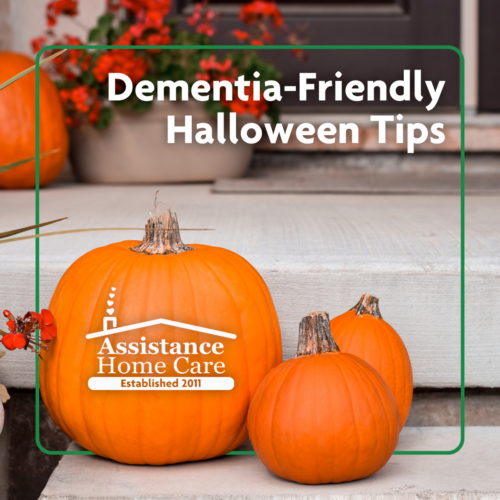A Dementia-Friendly Guide to Halloween: 13 Tips to Ease the Night for Your Loved One
Halloween is a fun and festive time, but for families caring for a loved one with dementia, it can bring unique challenges. Between the excitement of trick-or-treaters, unusual noises, and spooky decorations, Halloween night may cause confusion or anxiety for those living with dementia. Here’s a comprehensive guide with 13 dementia-friendly tips to help you and your loved one enjoy the evening while ensuring their comfort and safety.
1. Create a Calming Indoor Atmosphere
To help your loved one feel safe and relaxed, focus on creating a peaceful indoor environment. Close the blinds early in the evening to reduce visual distractions from outside, and keep the lighting soft and warm. Play calming music or familiar sounds to set a soothing tone, and fill the room with comforting fall scents like cinnamon or vanilla. These small changes can reduce anxiety and create a sense of comfort amidst the Halloween excitement outside.
2. Limit Surprise Knocks At The Door
If your loved one is in the mid-to-late stages of dementia, sudden noises or unexpected knocks at the door can be startling. Consider covering your doorbell and posting a sign on your front door asking trick-or-treaters not to knock or ring the doorbell. If you still want to share the Halloween spirit with Trick-or-Treaters, you might set a bowl of candy on the porch along with the sign.
Click Here to Download & Print a Free Dementia-Friendly Halloween Sign

3. Stick to a Routine
Having a regular routine comes along with caring for a person with dementia, and the disruption of schedules on Halloween can be unsettling. Try to keep the evening as normal as possible, sticking to familiar mealtimes, activities, and bedtime.

4. Keep Costumes Simple
If your loved one enjoys dressing up, choose a simple and comfortable costume that doesn’t involve masks or heavy face paint, which can be disorienting. For those who might not enjoy costumes, skip this step entirely and allow them to stay in their favorite comfortable clothing.

5. Provide a Quiet Space
Offer a quiet retreat if the excitement of Halloween becomes overwhelming. A designated calm room with soft music or a favorite TV show can give your loved one a comforting escape amidst the festivities in the neighborhood streets.
6. Keep Gatherings Small & Familiar
If you’re planning to celebrate with family or friends, keep the gathering small and familiar. Too much noise or social activity, like Halloween parties, can lead to sensory overload and dementia related behaviors. Instead, consider enjoying the evening with just a few close loved ones.

7. Use Familiar Decorations
In the early stages of dementia, it can be fun to decorate their home with pumpkins, mums, fall foliage and aromatic scents or candles. Use decorations they remember from past seasons and engage in conversations about past memories and traditions they had during this season of autumn.
8. Prepare for Sundowning
As Halloween falls later in the evening, it can increase the risk of sundowning, which is when dementia symptoms worsen in the late afternoon or evening. Be mindful of changes in mood or behavior and offer reassurance if your loved one becomes more agitated. Have familiar comfort items close at hand.

9. Talk Openly with Neighbors
Talking openly with your loved one’s neighbors can help make sure everyone is on the same page. Consider letting your close neighbors know about your loved one’s condition ahead of Halloween night. Tell your neighbors about your plan for trick-or-treaters and how they can help redirect the neighborhood kids enroute.
10. Engage in Calming Activities
If your loved one is in the mid-to-late stages of dementia and engaging with trick-or-treaters feels too chaotic, engage them in calming fall-themed activities indoors. Watching a lighthearted movie, working on a simple craft, or looking through fall-themed photo albums can provide a sense of connection without overstimulation.
11. Prepare for Reactions to Costumes
In the later stages of dementia, it’s common for people to become frightened by unfamiliar sights or people in costumes. Avoid taking your loved one to areas where they might encounter startling costumes & Halloween displays.
12. Monitor Your Loved One’s Reactions
Keep a close eye on how your loved one is reacting to the evening’s events. If they become anxious or overwhelmed, be ready to make adjustments, such as closing the blinds or turning off the porch light to end trick-or-treating early.
13. Ensure Caregiver Support
If managing Halloween feels overwhelming, remember that caregiver support is always available. Whether you need help preparing for the evening, or ongoing care for your loved one, ensuring that you have assistance can make all the difference. Our Team at Assistance Home Care is here to provide compassionate in-home care for families navigating the challenges of dementia.
Creating a Dementia-Friendly Halloween
Navigating Halloween with a loved one who has dementia doesn’t mean missing out on the holiday fun. By planning ahead, being mindful of their needs, and creating a calm environment, you can help your loved one feel safe and supported. Whether it’s through a quiet evening or light participation in the festivities, these tips can help make the night more enjoyable for everyone.
If you’re feeling unsure about how to prepare for Halloween—or need help in your caregiving journey—Assistance Home Care is always here to provide you with the support you need. Reach out to our Team today to learn more about how our home care services can help!








